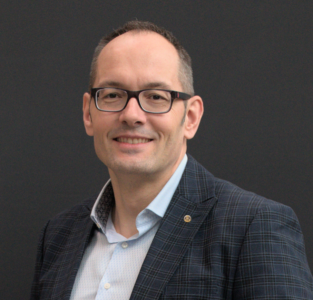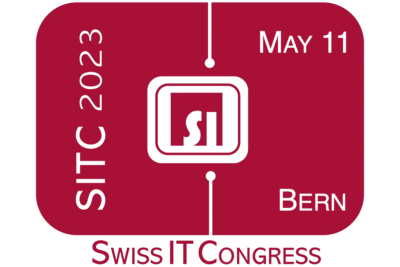In the series of SI evening talks, the talk of November 29, 2022 featured a hot topic: How can medical data be collected and used for the benefit of the patients and in a way that preserves the patients’ privacy.
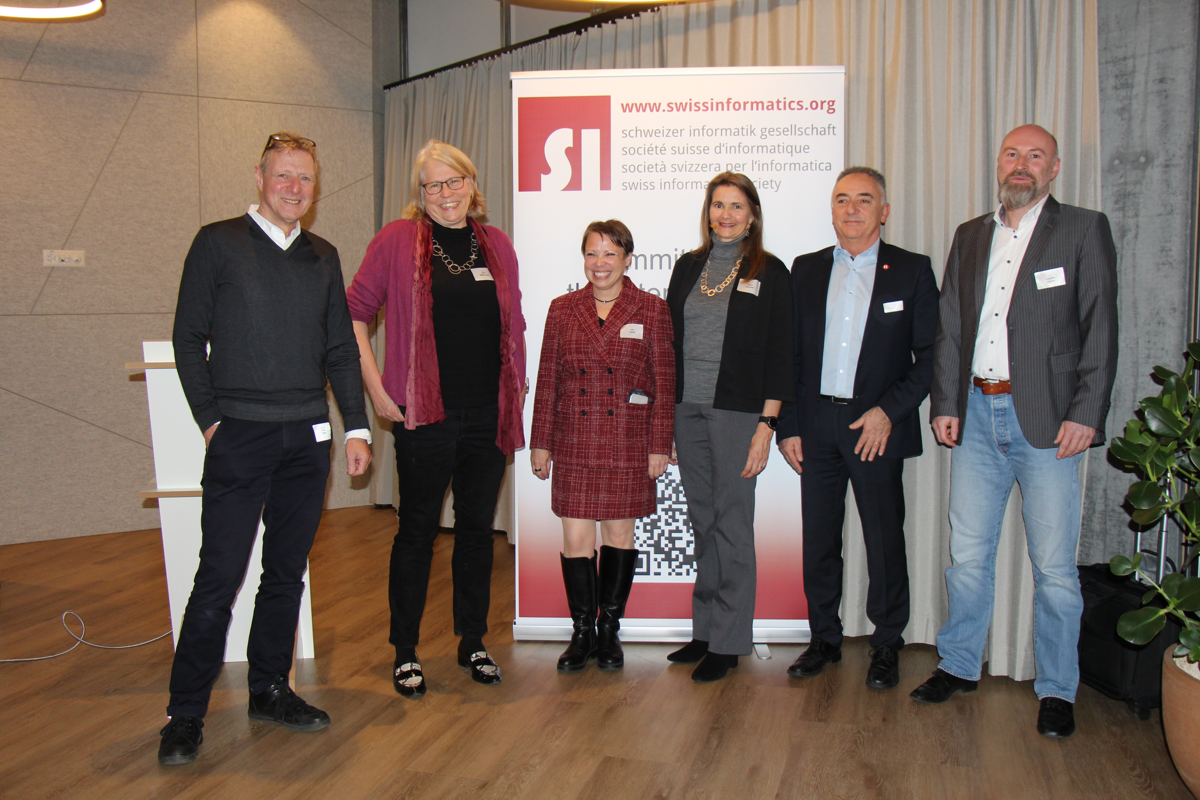
SI Evening Talk of November 29, 2022 at isolutions AG.
From left: Ernst Hafen (speaker), Elke Mittendorf (speaker), Iris Zeyda (co-organizer), Nora Sleumer (moderator, co-organizer), Francis Baud (SI president), Carsten Danzer (speaker).
Photo: Martin Glinz
The SI Evening Talk of November 29, 2022, hosted by isolutions AG, was devoted to the complex topic of medical data: “Data for the Benefit of the Patient”.
Today, Switzerland is still struggling in many ways to find its path forward in handling medical data and addressing the opportunities as well as the challenges that come with it. The collection and analysis of medical data offers new ways of diagnosis and can push the development for new treatments. However, the potential for abuse is also large, be it inadvertently through data leaks or through discriminatory practices, for example, denying access to healthcare based on data. As discussed in the previous SI evening talk on data protection (“New Federal Act on Data Protection (nFDPA): Application and Impact for Citizens and Enterprises“), the loss of control over one’s data is always at the forefront when handling sensitive data. This fear notwithstanding, the topic demands consideration.
SI brought together three distinguished speakers who shared their perspectives on the topic:
Dr. Carsten Danzer (Innovation Delivery Lead, Healthcare Industry, Roche),
Dr. Elke Mittendorf (Data Governance Manager, University Hospital Zurich), and
Prof. emeritus Dr. Ernst Hafen (ETH Zurich).
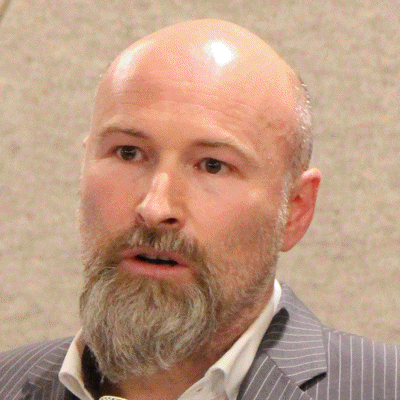
Carsten Danzer highlighted the need for a comprehensive understanding of medical data. On the one hand, we have the more obvious collection of “sick state” data which consists of data generated by healthcare professionals in the context of acute or chronic medical conditions. Data collected during a “healthy state” however – be it data from health tracking apps, or collected in a broader context through online shopping, consumption of social media, or other trackable online activities – is often neglected. This data can be at least as useful as “sick state” data in understanding a person’s health. “Sick state” data is already shared among various organizations such as providers, payors, pharma and diagnostics corporations as well as start-ups that all try to innovate the healthcare space. However, distrust towards tech companies when it comes to data handling as well as existing hurdles (e.g. data stored in silos in incompatible formats) complicate innovation. Carsten Danzer argued for a multidisciplinary, human-centric approach in handling medical data. This should incorporate good business practice, data security and ethical handling in order to establish a sustainable business ecosystem.
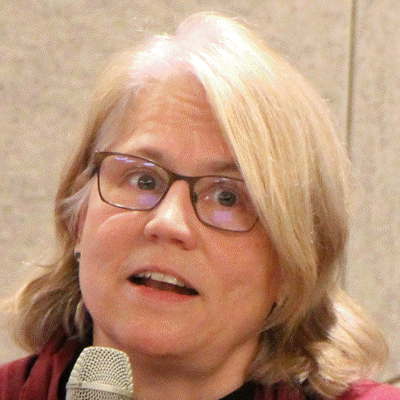
As a Data Governance Manager at the University Hospital Zurich, Elke Mittendorf brought an insider perspective to the event. She discussed problems with data collection and handling at the provider end and how many of the challenges could be circumvented or alleviated by improving the quality of the data collected at the source. Currently, medical data governance attempts to strike a balance between the use of the data, data protection, and the interests of people and organisations in the data. Current regulations surrounding data are not yet fit for data-driven work with health data. One problem is anonymization – the removal of any data that would make a person identifiable – in contrast to pseudonymization, which makes getting insights from data more difficult and is often impossible to do in absolute terms. For example, in the case of rare diseases, tracing back to a once-a-year diagnosis or to facial scans may be possible. This enforced disconnect between data hampers a more general exploration of data and shows how regulations are not created with today’s challenges in mind. According to Elke Mittendorf, many of these challenges will disappear when improving the way how data collection is structured and standardized.
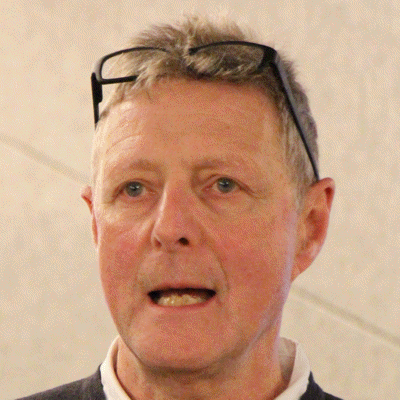
Finally, Ernst Hafen spoke as an advocate for people-centred health data: put the data into the hands of the people. He drew a comparison to personal finances and how people benefit from support and control structures surrounding our finances. The same structures should exist when it comes to medical data, allowing everyone to take control of their own data. Currently, personal medical data is not just collected by providers but through apps as well and, as Carsten Danzer already pointed out, these data sources are not linked. Instead, they are left scattered in different storages instead of collecting them with the person at the center. Ernst Hafen pointed to both the potential for innovation and the danger of abuse by leaving large corporations in control of a large swath of people’s personal medical data.
While there are some attempts to provide a people-centred health data system, such as the electronic medical dossier in Switzerland, they are lacking a clear value proposition for the providers of the data, the people. Today, there is no overarching system that provides value such as, for example, transparent oversight, opportunities for personal health benefits, or reduced health insurance costs. A new group of professionals acting as data stewards or data fiduciaries as we know it from the financial sector may be needed.
In the discussion, the speakers also pointed to different ways of handling medical data in other countries. In the USA, people have the right to request their medical data in an interoperable format. Estonia’s digital health records allow for nation-wide centralized access to medical data for both physicians and citizens. These systems require legislative adaptation and well-thought technical foundations, but will enable many opportunities for improvement and innovation in healthcare.
Comments from the audience pointed to potential dangers as, for example, discrimination based on data, and that future systems have to be set up in a way to limit these threats.
Other topics discussed were how data cannot just be linked to one person but is also linked to family, for example, through genome data, or that data may reveal the presence of physicians and care staff that provided medical assistance to a patient.
The question of consent was also brought up, both as a potential factor for the rightful secondary use of data and how it could overwhelm people to have to consider the use of their data repeatedly.
These points highlighted some of the opportunities and also challenges that a people-centred health data system could encounter. The speakers advised to look at existing solutions, for example, in other countries, instead of trying to reinvent the wheel.
Overall, this SI Evening Talk was a great opportunity for the audience to learn about the opportunities and challenges of handling medical data and about the various approaches for addressing them.
Iris Zeyda is Senior Consultant at isolutions AG. She is a member of the SI Board and a co-organizer of the SI Evening Talk on “Data for the Benefit of the Patient”.
Christian Schwab holds a Master of Arts in English from the University of Bern. He is a member of the SI office, taking care of marketing and social media support.
Speaker photos: Martin Glinz


